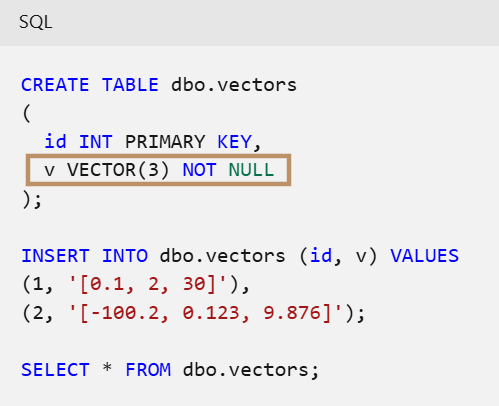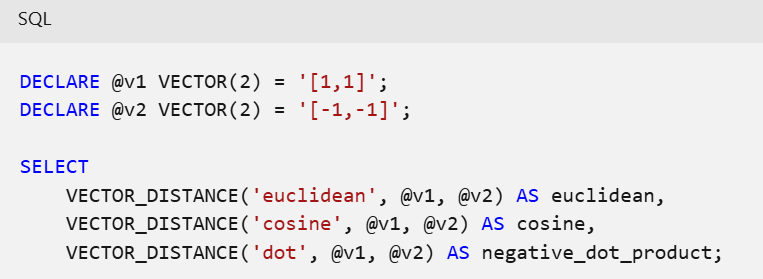Latest update - 19 June 2025
Vector Support is now Generally Available in all regions! Read the announcement here: Announcing General Availability of Native Vector Type & Functions in Azure SQL. Access to full documentation here: Vector data type.Public Preview of Native Vector Support in Azure SQL Database
We are excited to share that the dedicated vector data type in Azure SQL Database, which was previously available through the Early Adopter Preview, is now transitioning to Public Preview! As of today, the Vector data type and its associated functions are accessible to everyone, automatically and seamlessly. You can start using them immediately in any Azure SQL Database you currently have or will create in the future. Azure SQL MI will move to Public Preview in the next months: stay tuned for more details!
SQL Database as a Vector Store:
With the rise of AI and machine learning, the ability to handle vector data is crucial for applications like semantic search, recommendation systems, and more. By incorporating vector support directly into Azure SQL Database, we eliminate the need for separate vector databases, streamlining your data architecture and improving performance
Key Benefits:
1. Integrated Vector Data Type
Azure SQL provides a dedicated Vector data type that simplifies the creation, storage, and querying of vector embeddings directly within a relational database. This eliminates the need for separate vector databases and related integrations, increasing the security of your solutions while reducing the overall complexity.
2. Cost Efficiency and Seamless Integration
Using Azure SQL for vector search is often more cost-effective than adopting dedicated vector databases. Many organizations have relied on SQL Server for years, developing significant expertise in SQL technologies. By leveraging your current SQL Server databases for vector search, you can enhance data capabilities while minimizing expenses and avoiding the challenges of transitioning to new systems.
3. Built-in Vector Functions
Azure SQL includes essential built-in functions such as VECTOR_DISTANCE, VECTOR_NORM, and VECTOR_NORMALIZE, facilitating advanced operations on vectors, especially when the embedding model does not return normalized vectors.
4. Robust Ecosystem Integrations
To make your applications more intuitive and user-friendly, allowing for better interactions and more accurate information retrieval
- LangChain Integration: Build advanced applications that utilize vector embeddings for enhanced natural language processing and AI functionalities.
- Semantic Kernel Integration: Enable sophisticated semantic search capabilities for more intuitive data retrieval and analysis.
- EF Core Integration: This integration simplifies the management of vector data within your existing applications. If you’re using Entity Framework Core to build a web application, you can easily incorporate vector search capabilities without needing to overhaul your current setup, making it easier to enhance your app’s functionality.
- Azure Logic Apps Integration: By automating workflows that involve vector data, this integration can streamline processes in your applications. For example, if you’re using Azure Logic Apps to manage customer data, you can set up automated responses based on vector search results, allowing for quicker and more efficient customer interactions.
5. Performance and Scalability
Azure SQL is a robust service that combines scalability, security, and high availability, providing all the benefits of a modern database solution. Azure SQL leverages a sophisticated query optimizer and enterprise features to perform vector similarity searches alongside traditional SQL queries, enhancing data analysis and decision-making.
6. Support for Hybrid Workloads
Azure SQL supports hybrid workloads, allowing for the combination of vector search with traditional SQL queries. This flexibility is crucial for applications that require both structured and unstructured data processing.
Use Cases from Our Early Adopter Customers
Here are some impactful ways our Early Adopter customers are utilizing vector support in Azure SQL
- Semantic Searches on Documents: Enhancing the retrieval of information in legal, financial, and insurance documents for faster access to critical data.
- Job Matching: Connecting candidates with the right opportunities through advanced vector-based matching techniques.
- Personalized Recommendations: Exciting developments in retail and travel are enabling personalized shopping and travel experiences, while AI chatbots are becoming more effective at handling complex customer queries.
- Healthcare Analytics: Utilizing vector search to improve patient outcomes by analyzing pre-hospital notes and other relevant data.
- Log Data Analysis: Gaining deeper insights into system performance and operational efficiency by analyzing log data with vector capabilities
Getting Started:
To learn everything about Native Vector Support in SQL, take a look at the official documentation here.
You can also use this GitHub Repo full of samples: https://github.com/Azure-Samples/azure-sql-db-vector-search.
If you are looking for end-to-end samples, take a look here https://aka.ms/sqlai-samples where you’ll find:
- Retrieval Augmented Generation (RAG) on your own data using LangChain
- RAG and Natural-Language-to-SQL (NL2SQL) together to build a complete chatbot on your own data, using Semantic Kernel
- A tool to quickly vectorize data you already have in your database and enable it for AI
- And much more!
We’d love to hear your thoughts on this feature! Please share how you’re using it in the comments below and let us know any feedback or suggestions for future improvements. If you have specific requests, don’t forget to submit them through the Azure SQL and SQL Server feedback portal, where other users can also contribute and help us prioritize future developments. We look forward to hearing your ideas!





Are ANN indexes such as IVFFlat or HNSW supported for the new type?
We’re working on adding DiskANN support. Stay tuned! (And with that you’ll not need IVFFlat or HNSW indexes as DiskANN performs better than those. If you have a use case where you *specifically* need IVFFlat or HSNW, I’d love it hear it.) If you need an index support *today*, you can use this article to see on you can manually build an IVFFlat index: https://devblogs.microsoft.com/azure-sql/vector-search-optimization-via-kmeans-voronoi-cells-and-inverted-file-index-aka-cell-probing/
It seems like the “Vector” type is very limited in size, preventing the use of modern embedding models such as text-embedding-3-large. Is there any plan to increase the maximum size of the Vector type? It seems like the current limitation is very arbitrary
Hi Pascal,
Yes, at the moment, the dimensions are limited to 1998. Keep in mind that when using large embedding models like text-embedding-3-large, you can choose how many dimensions to get back. Take a look at the “Native support for shortening embeddings” section of the announcement here: OpenAI Announcement. You’ll notice that higher dimensions reflect a minuscule improvement, but at the same time, they require much more storage and power to be used. For example, text-embedding-3-large with 1024 dimensions has pretty much the same MTEB score as the 3072. My suggestion is to use text-embedding-3-large with 1024 dimensions. I’ll post an...
Awesome! I did not know that was an option, I’ll look into it. Thank you for the fast reply
I’m looking forward to testing this out. I’m a complete newbie to vectors and vector search. However, when I tried to a run simple json_array_to_vector function against my existing Azure SQL DB, I get “‘json_array_to_vector’ is not a recognized built-in function name. “. I don’t know if having Always Encrypted is turned on for this DB is the issue.
Hi Marco,
yes, the `json_array_to_vector` function (and the related `vector_to_json_array`) has been removed from the codebase as now that we have a native vecto r type you can just cast to and from it. We updated all the documentation and samples, but you might have missing some: can you please share the link or the resource where you found a reference to `json_array_to_vector` so that we can fix it? Thanks!
This is awesome!
Will this feature be available in on-premise editions of SQL Server? If so, when can it be expected?
Thanks
Your question couldn’t have come at a more perfect time! Here’s the answer: https://www.linkedin.com/pulse/announcing-sql-server-2025-bob-ward-6s0hc/
I’ve been playing with the new vector data type and functions and they’re great! But one issue I’ve discovered: SqlPackage is not compatible with the new data type.
Yep, that is a known issue (look at all limitations and known issues that exist in the preview here: https://learn.microsoft.com/en-us/sql/t-sql/data-types/vector-data-type?view=azuresqldb-current&tabs=csharp-sample#limitations
When is the actual langchain integration coming? the linkn points to an empty github repo
Hi Marius – The link to the Langchain repo is updated now. You can try it out
In the coming weeks will be adding the full documentation and samples.
Soon, very soon!